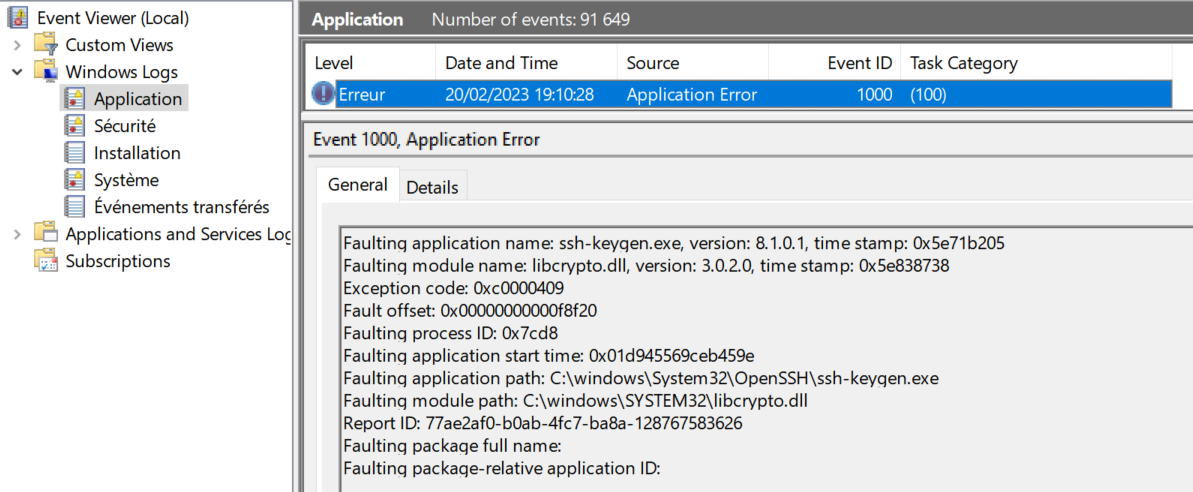To answer my own question, after posting on openssl mailing list got this:
Here is C code to convert from an OpenSSL public key to an OpenSSH public key.
You can grab the code from this link and compile it yourself:
static unsigned char pSshHeader[11] = { 0x00, 0x00, 0x00, 0x07, 0x73, 0x73, 0x68, 0x2D, 0x72, 0x73, 0x61};
static int SshEncodeBuffer(unsigned char *pEncoding, int bufferLen, unsigned char* pBuffer)
{
int adjustedLen = bufferLen, index;
if (*pBuffer & 0x80)
{
adjustedLen++;
pEncoding[4] = 0;
index = 5;
}
else
{
index = 4;
}
pEncoding[0] = (unsigned char) (adjustedLen >> 24);
pEncoding[1] = (unsigned char) (adjustedLen >> 16);
pEncoding[2] = (unsigned char) (adjustedLen >> 8);
pEncoding[3] = (unsigned char) (adjustedLen );
memcpy(&pEncoding[index], pBuffer, bufferLen);
return index + bufferLen;
}
int main(int argc, char** argv)
{
int iRet = 0;
int nLen = 0, eLen = 0;
int encodingLength = 0;
int index = 0;
unsigned char *nBytes = NULL, *eBytes = NULL;
unsigned char* pEncoding = NULL;
FILE* pFile = NULL;
EVP_PKEY *pPubKey = NULL;
RSA* pRsa = NULL;
BIO *bio, *b64;
ERR_load_crypto_strings();
OpenSSL_add_all_algorithms();
if (argc != 3)
{
printf("usage: %s public_key_file_name ssh_key_description\n", argv[0]);
iRet = 1;
goto error;
}
pFile = fopen(argv[1], "rt");
if (!pFile)
{
printf("Failed to open the given file\n");
iRet = 2;
goto error;
}
pPubKey = PEM_read_PUBKEY(pFile, NULL, NULL, NULL);
if (!pPubKey)
{
printf("Unable to decode public key from the given file: %s\n", ERR_error_string(ERR_get_error(), NULL));
iRet = 3;
goto error;
}
if (EVP_PKEY_type(pPubKey->type) != EVP_PKEY_RSA)
{
printf("Only RSA public keys are currently supported\n");
iRet = 4;
goto error;
}
pRsa = EVP_PKEY_get1_RSA(pPubKey);
if (!pRsa)
{
printf("Failed to get RSA public key : %s\n", ERR_error_string(ERR_get_error(), NULL));
iRet = 5;
goto error;
}
// reading the modulus
nLen = BN_num_bytes(pRsa->n);
nBytes = (unsigned char*) malloc(nLen);
BN_bn2bin(pRsa->n, nBytes);
// reading the public exponent
eLen = BN_num_bytes(pRsa->e);
eBytes = (unsigned char*) malloc(eLen);
BN_bn2bin(pRsa->e, eBytes);
encodingLength = 11 + 4 + eLen + 4 + nLen;
// correct depending on the MSB of e and N
if (eBytes[0] & 0x80)
encodingLength++;
if (nBytes[0] & 0x80)
encodingLength++;
pEncoding = (unsigned char*) malloc(encodingLength);
memcpy(pEncoding, pSshHeader, 11);
index = SshEncodeBuffer(&pEncoding[11], eLen, eBytes);
index = SshEncodeBuffer(&pEncoding[11 + index], nLen, nBytes);
b64 = BIO_new(BIO_f_base64());
BIO_set_flags(b64, BIO_FLAGS_BASE64_NO_NL);
bio = BIO_new_fp(stdout, BIO_NOCLOSE);
BIO_printf(bio, "ssh-rsa ");
bio = BIO_push(b64, bio);
BIO_write(bio, pEncoding, encodingLength);
BIO_flush(bio);
bio = BIO_pop(b64);
BIO_printf(bio, " %s\n", argv[2]);
BIO_flush(bio);
BIO_free_all(bio);
BIO_free(b64);
error:
if (pFile)
fclose(pFile);
if (pRsa)
RSA_free(pRsa);
if (pPubKey)
EVP_PKEY_free(pPubKey);
if (nBytes)
free(nBytes);
if (eBytes)
free(eBytes);
if (pEncoding)
free(pEncoding);
EVP_cleanup();
ERR_free_strings();
return iRet;
}



ssh-keygen -y -f private_key1.pem > public_key1.pubworked great for me. – Albinossh-keygen -i -m PKCS8 -f public-key.pem– Ritaritardando-mis different for-i/-e. So my friends, please make sure you know what you want and what you have. :-) – Margeretssh-keygen -y -f private_key1.pem >public_key1.pubworks well on my Mac. It will read a PEM encoded OpenSSH Private (not Public) key file and convert it to the format necessary for anid_rsa.pubor~/.ssh/authorized_keysfile. I confirmed this by generating an SSH key in Azure, downloading the private key, converting it with the above command, and then comparing the output to the public key displayed on Azure. They matched. – Okiessh-keygengenerate PEM encoded SSH private keys? Instead of downloading the SSH PEM private key, why didn't you convert the private key to a public key in your Linux VM on Azure and download the public key? – Pigeonwing